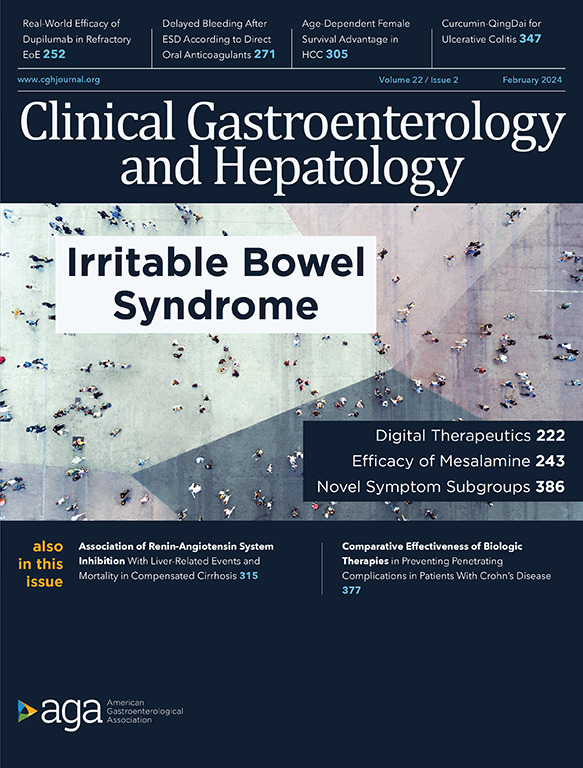Patients With Inflammatory Bowel Disease Are at Increased Risk for Complications of Herpes Zoster
IF 11.6
1区 医学
Q1 GASTROENTEROLOGY & HEPATOLOGY
引用次数: 0
Abstract
Background & Aims
Patients with inflammatory bowel disease (IBD) are at an increased risk for vaccine-preventable diseases, such as herpes zoster (HZ). The aim of this study was to determine whether complications of HZ are more frequent in patients with IBD than in non-IBD controls.
Methods
This was a retrospective, cohort study using the Optum Research Database. Patients with IBD were matched 1:1 to non-IBD controls based on age, sex, and index year, which was defined as the diagnosis of HZ. We then identified the complications of HZ that occurred up to 90 days after the index date. We compared patients with IBD with non-IBD controls and evaluated the 90-day risk of HZ complications. We used a composite primary outcome for any HZ complication. Secondary outcomes were risk factors for complications.
Results
A total of 4756 patients with IBD met the inclusion criteria and were matched to the controls. Patients with IBD were more likely to have complications of HZ than controls (738 [15.52%] vs 595 [12.51%]; P < .0001). Patients with IBD with higher comorbidity scores were more likely to develop complications (1.86 vs 1.18; P < .0001). In the logistic regression analysis of patients with IBD having a higher comorbidity score, above 50 years of age, on anti-tumor necrosis factor (TNF) or corticosteroids were all at increased risk of a complication of HZ.
Conclusion
Patients with IBD are more likely to have complications of HZ than controls. Efforts are needed to increase HZ vaccine uptake to reduce the morbidity of HZ.
炎症性肠病患者并发带状疱疹的风险更高。
背景和目的:炎症性肠病(IBD)患者患带状疱疹(HZ)等疫苗可预防疾病的风险增加。本研究旨在确定 IBD 患者是否比非 IBD 对照组更容易出现 HZ 并发症:这是一项使用 Optum 研究数据库进行的回顾性队列研究。IBD 患者与非 IBD 对照组患者根据年龄、性别和指标年(指标年被定义为 HZ 诊断年)进行 1:1 匹配。然后,我们确定了指数日期后 90 天内发生的 HZ 并发症。我们将 IBD 患者与非 IBD 对照组进行了比较,并评估了 90 天内 HZ 并发症的风险。我们使用了一个综合的主要结果,即任何 HZ 并发症。次要结果为并发症的风险因素:4,756 名 IBD 患者符合纳入标准,并与对照组匹配。与对照组相比,IBD 患者更有可能出现 HZ 并发症[738 例(15.52%)对 595 例(12.51%),P < 0.0001]。合并症评分较高的 IBD 患者更有可能出现并发症(1.86 对 1.18,P < 0.0001)。在逻辑回归分析中,合并症评分较高、年龄超过50岁、服用抗肿瘤坏死因子或皮质类固醇的IBD患者发生HZ并发症的风险均有所增加:结论:与对照组相比,IBD患者更容易出现HZ并发症。需要努力提高HZ疫苗的接种率,以降低HZ的发病率。
本文章由计算机程序翻译,如有差异,请以英文原文为准。
求助全文
约1分钟内获得全文
求助全文
来源期刊
CiteScore
16.90
自引率
4.80%
发文量
903
审稿时长
22 days
期刊介绍:
Clinical Gastroenterology and Hepatology (CGH) is dedicated to offering readers a comprehensive exploration of themes in clinical gastroenterology and hepatology. Encompassing diagnostic, endoscopic, interventional, and therapeutic advances, the journal covers areas such as cancer, inflammatory diseases, functional gastrointestinal disorders, nutrition, absorption, and secretion.
As a peer-reviewed publication, CGH features original articles and scholarly reviews, ensuring immediate relevance to the practice of gastroenterology and hepatology. Beyond peer-reviewed content, the journal includes invited key reviews and articles on endoscopy/practice-based technology, health-care policy, and practice management. Multimedia elements, including images, video abstracts, and podcasts, enhance the reader's experience. CGH remains actively engaged with its audience through updates and commentary shared via platforms such as Facebook and Twitter.

 求助内容:
求助内容: 应助结果提醒方式:
应助结果提醒方式:


